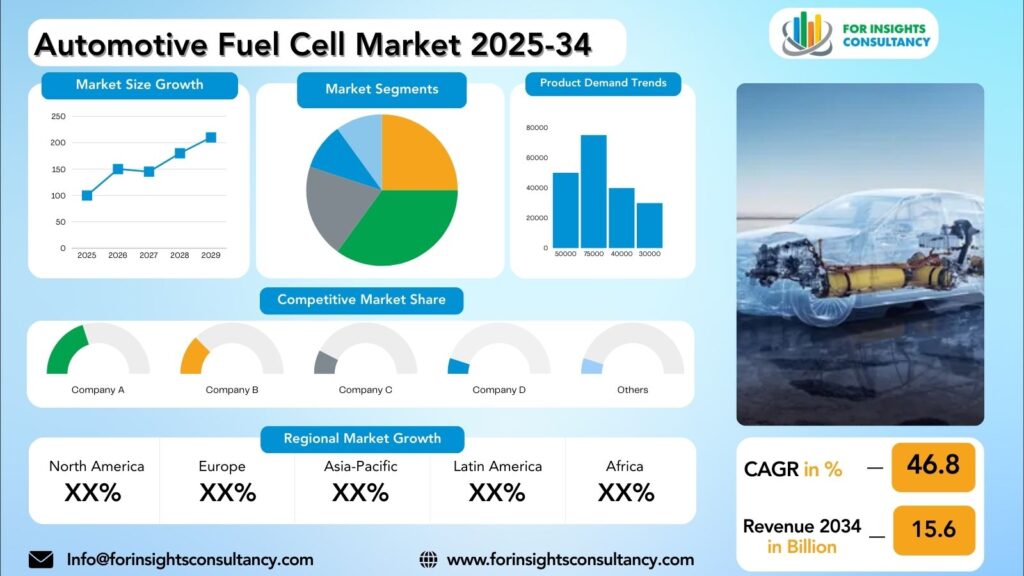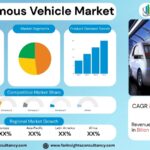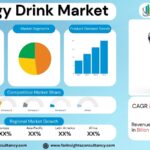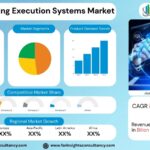
Automotive Fuel Cell Market Research Report By Component (Fuel Processor, Power Conditioners, Fuel Cell Stack, Air Compressors, Humidifiers), By Fuel Cell Type (Polymer Electrolyte Membrane Fuel Cells, Direct Methanol Fuel Cells, Hydrogen, Ethanol), By Propulsion (FCEV, FCHEV), By Vehicle Type (Passenger Vehicles, Light Commercial Vehicles (LCVs), Buses, Trucks, Off-road Vehicles), And Region Global Market Analysis and Forecast, 2025-2034
Aug-2025 Formats | PDF | Category: Automotive | Delivery: 24 to 72 Hours
Automotive Fuel Cell Market is forecast to increase from USD 3.4 billion in 2025 to USD 15.7 billion by 2034, at a CAGR of 46.8%.
Automotive Fuel Cell Market: A Comprehensive Overview and Future Developments
The automotive fuel cell market is experiencing significant growth due to technological advancements, government regulations promoting clean energy solutions, and increasing consumer awareness of environmental issues. Major automakers like Toyota, Honda, and Hyundai have invested heavily in fuel cell technology, bringing fuel cell vehicles to the market.
Future developments in the market include increased production and adoption, as production costs decrease and economies of scale are achieved, making fuel cell vehicles more affordable and accessible to a wider range of consumers. Infrastructure development is also underway to expand the network of hydrogen refueling stations, a crucial investment for widespread fuel cell vehicle adoption.
Research and development efforts are also pushing the boundaries of fuel cell technology, focusing on increasing efficiency, reducing costs, and improving performance. Innovations such as solid oxide fuel cells, proton exchange membrane fuel cells, and direct methanol fuel cells are expected to drive the next wave of advancements in the industry.
Automotive Fuel Cell Market Dynamics
Growth Drivers
The automotive fuel cell market is experiencing significant growth due to government support, environmental regulations, technological advancements, and consumer awareness. Governments are promoting the adoption of fuel cell vehicles through incentives, subsidies, and infrastructure development. Environmental regulations are pushing automakers to invest in clean technologies like fuel cells, while ongoing research and development efforts are making fuel cell technology more efficient, reliable, and cost-effective. Strategic partnerships between automakers, technology companies, and energy providers are accelerating innovation and market adoption. As consumers become more aware of the environmental impacts of traditional vehicles, they are seeking greener transportation options. The automotive fuel cell market is poised for significant growth in the coming years, as the demand for clean and sustainable transportation solutions continues to rise. As automakers invest in fuel cell technology and expand their product offerings, the adoption of fuel cell vehicles is expected to increase.
Restraints
The automotive fuel cell market faces several challenges, including limited infrastructure for hydrogen-powered vehicles, high production costs, limited range and performance, lack of consumer awareness, and regulatory hurdles. The scarcity of hydrogen refueling stations and high production costs make it difficult for consumers to access fuel for fuel cell vehicles, deterring potential buyers from investing. Fuel cell technology is also relatively expensive compared to traditional internal combustion engines, making it less affordable for the average consumer. Fuel cell vehicles also have limited range compared to electric vehicles, which can deter long-distance driving consumers. Additionally, their performance may not match the acceleration and power of traditional gasoline cars, posing a challenge for performance-driven consumers.
Despite the numerous benefits of fuel cell technology, there is still a lack of consumer awareness and education about the technology, leading to reluctance to adopt fuel cell vehicles. Increased marketing and educational efforts are needed to raise awareness and drive market demand. Regulatory hurdles, such as uncertainty surrounding regulations, incentives, and infrastructure investment, also pose a challenge. Policy-makers need to establish clear guidelines to support the development and deployment of fuel cell vehicles.
Despite the potential for growth and innovation in the automotive fuel cell market, several restraints need to be addressed to fully realize the benefits of fuel cell technology. By overcoming these challenges through increased infrastructure investment, cost reduction strategies, consumer education, and regulatory support, the automotive fuel cell market can continue to thrive and revolutionize the transportation industry.
Opportunity
The global demand for zero-emission vehicles is on the rise due to concerns about air pollution and global warming. Automotive fuel cells offer a clean and efficient solution for powering electric vehicles, making them an attractive option for environmentally conscious consumers. Governments are introducing policies and incentives to promote the adoption of fuel cell vehicles, such as subsidies and tax credits, creating a favorable environment for the growth of the automotive fuel cell market.
Continuous advancements in fuel cell technology are driving the adoption of fuel cell vehicles and expanding market opportunities for industry players. Collaboration between automotive manufacturers, fuel cell suppliers, and other stakeholders is key to unlocking the full potential of the automotive fuel cell market. By developing integrated fuel cell systems, streamlining production processes, and establishing a robust infrastructure for hydrogen refueling, companies can accelerate the commercialization of fuel cell vehicles and maximize their market share.
The automotive fuel cell market is experiencing rapid global expansion, with significant growth opportunities emerging in key regions like North America, Europe, and Asia-Pacific. As more countries reduce their carbon footprint and promote sustainable transportation solutions, the demand for fuel cell vehicles is expected to increase, creating new market prospects for industry players.
Challenges
The automotive fuel cell market faces several challenges, including the high cost of fuel cell technology, the lack of hydrogen infrastructure, and the limitations of fuel cell durability. Despite being known for their high efficiency and low emissions, fuel cells have limitations in durability, leading to reduced performance and reliability. Improving the durability of fuel cells is crucial for ensuring the long-term viability of fuel cell technology in the automotive sector.
Competition in the automotive industry is fierce, with electric vehicles gaining market share due to advancements in battery technology and charging infrastructure. Fuel cell vehicles need to differentiate themselves from other alternative powertrain options to succeed. Public perception plays a key role in the adoption of new technologies, and manufacturers need to invest in educating consumers about the benefits of fuel cell vehicles.
To overcome these challenges, industry players are taking strategic actions such as reducing costs, expanding infrastructure, improving durability, differentiation, and consumer education. Research and development efforts are focused on exploring alternative materials and manufacturing processes, while collaborations are formed to establish networks of hydrogen refueling stations. Advances in fuel cell materials and design are being made to improve the durability of fuel cell components, increasing the reliability and performance of fuel cell vehicles.
Differentiation is also being made by manufacturers, highlighting unique selling points of fuel cell vehicles like long driving range and quick refueling times. Marketing efforts are focused on educating consumers about the benefits of fuel cell technology.
In conclusion, the automotive fuel cell market faces several challenges, including high costs, infrastructure, durability, competition, and public perception. To overcome these obstacles, industry players must focus on addressing these challenges and driving demand for fuel cell vehicles.
Automotive Fuel Cell Market Top Companies Covered In This Report:
Evaluate The Strategic Positioning And Innovation Pipelines Of Leading Market Companies-From Multinational Enterprises To Disruptive Regional Firms. Understand How Key Players Are Innovating, Expanding, And Capturing Value, And Use Competitive Benchmarks To Plan Your Next Move.
- Ballard Power Systems
- Tw Horizon Fuel Cell Technologies
- Hyundai Motor Company
- Elringklinger Ag
- Intelligent Energy Limited
- Nedstack Fuel Cell Technology
- Toyota Motor Corporation
- Plug Power Inc.
- Nuvera Fuel Cells Llc
- Powercell Sweden Ab
Automotive Fuel Cell Market News
2025 News
Hyundai Motor Company showcased its hydrogen mobility vision at the World Congress of the Econometric Society. The company unveiled the all-new NEXO, a redesigned fuel cell electric vehicle (FCEV) with a targeted range of over 700 kilometers. This launch, along with the presentation of its hydrogen-powered trucks and buses, reinforced Hyundai’s commitment to building a comprehensive hydrogen ecosystem.
Toyota Motor announced the launch of its new 3rd generation fuel cell system and partnered with VDL Groep to launch fuel cell trucks on logistical routes in Europe. This move signals a transition from pilot projects to full-scale commercialization, particularly in the heavy-duty trucking sector.
Tata Motors in India launched the first commercial hydrogen truck trials, a significant step toward a net-zero emission future in one of the world’s largest commercial vehicle markets.
2024 News
Toyota and BMW announced a deepening of their collaboration, with a focus on jointly developing next-generation fuel cell systems for a planned launch of a series-production hydrogen vehicle in 2028. This partnership aims to leverage shared expertise and drive down the costs of fuel cell technology through economies of scale.
Ballard Power Systems, a leader in proton exchange membrane (PEM) fuel cells, signed a long-term agreement to supply fuel cell modules for buses and commercial vehicles. The company’s focus on heavy-duty applications highlights the growing recognition of hydrogen’s advantages for trucks and public transport due to its fast refueling and long range.
Plug Power began operations at its green hydrogen production facility in Georgia, a key step in building out the hydrogen infrastructure needed to support a growing fleet of fuel cell vehicles. This focus on “green” hydrogen—produced using renewable energy—was a major theme, as it addresses the environmental concerns associated with traditional hydrogen production.
Segmented View of the Industry:
The Automotive Fuel Cell Market Is Mapped Through A Multidimensional Lens-Tracking Shifts Across Product Type, Applications, And Geographic Regions. This Segmented Approach Enables Businesses To Localize Their Growth Plans And Align Offerings With The Most Profitable Demand Centers.
Segmentation by Fuel Cell Type
- Direct Methanol Fuel Cells
- Hydrogen
- Ethanol
- Polymer Electrolyte Membrane Fuel Cells
Segmentation by Component
- Fuel Processor
- Power Conditioners
- Fuel Cell Stack
- Air Compressors
- Humidifiers
Segmentation by Power Rating
- Less Than 150kW
- 150 To 250kW
- Greater Than 250kW
Segmentation by Vehicle Type
- Passenger Vehicles
- Light Commercial Vehicles (LCVs)
- Buses
- Trucks
- Off-road Vehicles
Global Geographic Coverage:
The Report Provides In-Depth Qualitative and Quantitative Data On the Automotive Fuel Cell Market For All Of The Regions And Countries Listed Below:
North America
North America is a major player in the automotive fuel cell market, with the US and Canada leading the way in technology development and adoption. Government initiatives and increased investment in research have fueled the industry’s growth, while the demand for zero-emission vehicles has expanded the market. Companies like Ballard Power Systems and Hydrogenics are at the forefront of fuel cell technology, with the Canadian government supporting its development through funding initiatives and partnerships with private sector companies. North America’s commitment to sustainability and innovation makes it an ideal environment for fuel cell technology advancement, with continued growth expected in the coming years.
Europe
Europe is leading the way in fuel cell technology adoption in the automotive sector, with Germany, the United Kingdom, and France being key players. Germany is a pioneer in fuel cell technology, with leading manufacturers and research institutions driving advancements. The UK government’s support, including grants and tax benefits, is driving growth in the fuel cell market, attracting consumers to switch to cleaner transportation options. France, with its focus on clean energy, is also investing in hydrogen infrastructure, paving the way for a greener automotive future. These countries are driving the adoption of fuel cell vehicles, demonstrating their commitment to sustainability and reducing carbon emissions. The UK’s automotive fuel cell market is expected to grow significantly in the coming years.
Asia Pacific
China, one of the world’s largest automotive markets, is actively promoting the adoption of fuel cell vehicles (FCVs) to reduce air pollution and dependence on fossil fuels. The Chinese government has implemented policies and financial incentives to support the development and deployment of fuel cell technology, with leading manufacturers like NIO, BAIC, and Geely investing heavily in research and development. Japan, with major automakers like Toyota and Honda, is at the forefront of fuel cell technology, with ambitious targets set and a focus on hydrogen infrastructure. South Korea, with Hyundai and Kia leading in fuel cell vehicle production, is also a key player in the Automotive Fuel Cell Market, with companies like Hyundai and Kia leading the way. The South Korean government has promoted hydrogen infrastructure development and introduced incentives to encourage FCV adoption, leading to a steady increase in fuel cell vehicles on its roads.
Middle East and Africa
United Arab Emirates (UAE) is leading the way in adopting cutting-edge technologies, particularly in the automotive fuel cell market. With a focus on sustainability and clean energy, companies like Toyota and Hyundai have established operations in the UAE. The UAE government’s initiatives to promote green mobility are expected to drive the growth of the market in the coming years. The abundance of sunlight in the region makes hydrogen production a viable option, further boosting the adoption of fuel cell vehicles.
Saudi Arabia, one of the largest oil-producing nations, is looking to diversify its energy portfolio and reduce its dependence on fossil fuels. The automotive fuel cell market presents a promising opportunity for Saudi Arabia to transition towards sustainable transportation. The government has been actively promoting hydrogen fuel cell technology through partnerships with global automakers and investment in infrastructure.
South Africa is emerging as a key player in the African automotive fuel cell market. The government recognizes the potential of fuel cell technology in reducing greenhouse gas emissions and promoting clean energy solutions. With a growing automotive industry and increasing demand for eco-friendly vehicles, South Africa is exploring partnerships with fuel cell manufacturers and research institutions.
Nigeria, one of the largest economies in Africa, is also showing interest in the automotive fuel cell market. The country faces challenges with air pollution and over-reliance on fossil fuels for transportation, leading to a growing interest in alternative fuel sources, including fuel cell technology. As awareness grows and technology advances, Nigeria is expected to play a significant role in the development of the automotive fuel cell market in Africa.
Reasons to Buy:
- The Research Would Help Top Administration/Policymakers/Professionals/Product Advancements/Sales Managers And Stakeholders In This Market In The Following Ways.
- The Report Provides Automotive Fuel Cell Market Revenues At The Worldwide, Regional, And Country Levels With A Complete Analysis To 2034 Permitting Companies To Analyze Their Market Share And Analyze Projections, And Find New Markets To Aim For.
- To Understand The Most Affecting Driving And Restraining Forces In The Market And Their Impact On The Global Market.
- Major Changes And Assessment In Market Dynamics And Developments.
- The Objective Of The Automotive Fuel Cell Market Report Is To Identify New Business Opportunities Using Quantitative Market Forecasts.
- Formulate Sales And Marketing Strategies By Gaining An Understanding Of Competitors, Their Positioning, And Strengths & Weaknesses.
Faq – What Global Leaders Are Asking
What Is The Growth Prospect For The Automotive Fuel Cell Market By 2034?
Automotive Fuel Cell Market Is Expected To Achieve A Stable Growth Rate With A Compound Annual Growth Rate (Cagr) Of About 46.8% From 2025 Through 2034.
What Is Driving The Growth Of The Automotive Fuel Cell Market?
The growth of the automotive fuel cell market is driven by increasing global government initiatives and strict regulations promoting zero-emission vehicles to combat climate change. This is further fueled by advancements in hydrogen fuel cell technology, which offers advantages like long driving range and quick refueling, making it ideal for heavy-duty commercial vehicles.
Who Are The Key Players In The Automotive Fuel Cell Market, And What Are Their Market Shares?
The Automotive Fuel Cell Market Includes Major Companies Like Ballard Power Systems, Tw Horizon Fuel Cell Technologies, Hyundai Motor Company, Elringklinger Ag, Intelligent Energy Limited, Nedstack Fuel Cell Technology, Toyota Motor Corporation, Plug Power Inc., Nuvera Fuel Cells Llc, Powercell Sweden Ab.
Specific Market Share Data Is Not Publicly Available and Is Typically Provided In Detailed, Proprietary Market Research Reports.
Which Regions Are Leading the Automotive Fuel Cell Market Growth?
The Asia-Pacific region is the clear leader in the automotive fuel cell market, driven by strong government support and major investments in hydrogen infrastructure in countries like China, Japan, and South Korea. North America is also a key growth region, fueled by a high concentration of research and development, supportive policies, and the presence of major automotive and tech companies.
Customization: We Can Provide Following Things
1) On Market More Company Profiles (Competitors)
2) Data About Particular Country Or Region
3) We Will Incorporate The Same With No Additional Cost (Post Conducting Feasibility).
Any Requirement Contact Us: Https://Www.Forinsightsconsultancy.Com/Contact-Us/
Table of Contents
For TOC Contact us: https://forinsightsconsultancy.com/contact-us/






